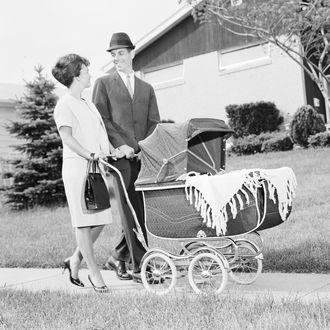
NEW MOM explores the brilliant, terrible, wonderful, confusing realities of first-time motherhood. It’s for anybody who wants to be a new mom, is a new mom, was a new mom, or wants really good reasons to never be a new mom.
A few days ago I stood in my kitchen gazing at a sink full of cocoa mugs and eggy plates. It’s my husband’s job to do the morning dishes before he goes off to work, and he’d run out of time and left them. I felt annoyed. There it was, the small-scale rage that so often prickles the skin of marriage. My writing would have to wait until after I did his chore for him. I sighed, turned on NPR, and loaded the dishwasher.
If I could turn back time, all Cher-like, and tell my new mom self just one thing, it would be this: Gender roles are more powerful than you can even imagine, as powerful as the tides. Fighting their pull requires vigilance, cunning, and sometimes a lot of yelling. But you must fight them, I would say to that younger self. And I have no doubt that she — hazy-eyed, wild-haired, lightly doused in baby spit, exhausted by chores, exhausted by nursing, exhausted by being gendered — would stare back at me silently and ignore me altogether.
Gender roles grip us, tugging at our shirts when we try to escape. Women my age — which is middle — find ourselves amazed that all these years after the second wave of feminism crested, we remain sunk in biology, to use A.S. Byatt’s unforgettable phrase from her novel Still Life. Part of the gendering of heterosexual parenthood is social, but there’s also a difficult-to-transcend biological reality that can feel imprisoning. We daughters of second-wave feminism thought we’d be free. And yet here we find ourselves, doing the dishes, planning the meals, making the doctor’s appointments, white-knuckling our way through another all-female PTA meeting.
And of course, it cuts both ways. I’m not the only one who feels trapped by gender; the burden of providing rests heavily upon my husband’s shoulders. I’m continually chagrined that my marriage isn’t an equal partnership when it comes to domestic chores and child care — but the fact is, you could as easily tell the gender story from another perspective: It would be the story of my husband, sitting with the bills, figuring out how they will be paid, furious that he is alone with this sense of financial responsibility.
In truth, neither of us has been entirely alone in our given roles. After all, I also earned money. After all, he also did chores. But I think he didn’t do enough, and he thinks I didn’t earn enough.
It’s not as if my husband and I were ignorant of a better way. We went into this marriage dreaming dreams of parity. We were both writers, colleagues at the alternative weekly where we worked, a team, a matched set. One of us happened to be female, one male. That difference was hot in bed and didn’t seem especially germane anywhere else. And then we had a baby, and then another. At the time, the man had a writing contract and the woman did not — we didn’t see that this was an expression of something greater than the two of us, of institutional or cultural sexism.
When a spot at Sasha’s preschool became open, choices had to be made — that day, by four o’clock. In that moment, we chose to put our child in this sweet preschool program, which had shorter hours, but then that was part of its sweetness. We wanted to keep our 2-and-a-half-year-old daughter at home, take care of her ourselves. Which meant, as it turned out, that I would take care of her. After all, I was the one who was earning less. From that decision cascaded a thousand others, each one subtly reinforcing our roles. For reasons that we believed were purely economic and emotional, we made a series of choices that led ineluctably to my becoming the person who is in charge of the children and the house.
It was I who harbored the babysitter’s phone number, I who remembered shoe sizes, I who kept track of allergies. Better to have all that information reside in one place, the place called mother. It wasn’t just the labor that took over my life, it was my comprehensive grasp and knowledge of the labor. As the minder of the domestic arcana, I simultaneously made myself essential and my husband vestigial. The more caregiver relationships I managed, the more details about drop-offs and pick-ups and appointments I kept filed in my head, the more I found myself the sole toiler in the field we’ve come to call emotional labor.
I recently learned the difference between a maze and a labyrinth. A maze involves choices of direction, while a labyrinth is what’s called unicursal — a single path which can only be walked one way. My husband and I, it seems to me now, thought we were roaming free through marriage and parenthood. We thought we were carefully setting our own destiny as a couple. And yet our path turned out to be unicursal: We ended up here, in this embarrassingly preordained place. The woman jobs are my jobs; the man jobs are his. The woman self is who I get to be.
Doris Lessing wrote about this problem in The Golden Notebook, published in 1962. Even though the book’s protagonist, Anna Wulf, isn’t married, she is still a servant to the needs of her lover Michael and her daughter Janet. She wakes one morning, filled with anxiety over the needs of others: “It must be about six o’clock. My knees are tense … ‘the housewife’s disease’ has taken hold of me … the current has been switched on: I must-dress-Janet-get-her-breakfast-send-her-off-to-school-get-Michael’s-breakfast-don’t-forget-I’m-out-of-tea-etc.-etc. With this useless but apparently unavoidable tension resentment is also switched on. Resentment against what? An unfairness. That I should have to spend so much of my time worrying over details.”
It’s not just the doing of the chores that eats at Anna Wulf, it’s the aforementioned emotional labor. She is tense and angry over the fact that she is alone in being the woman self. “It is the disease of women in our time,” she goes on. “The unlucky ones, who do not know it is impersonal, turn it against their men. The lucky ones like me — fight it.”
This is what gets called luck in Lessing’s world — the ability and will to fight the housewife’s disease, to know it’s an “impersonal poison.” This poison is well known to any woman who’s ever regarded the landscape between the making of dinner and the singing-to-sleep as a vast wasteland. I don’t know any mother who hasn’t at least once felt that horror, though we meet the moment with varying levels of despair or sangfroid, depending on nature, depending on situation, depending on wealth and husband and poverty and career pressures.
I fear I have been one of Lessing’s unlucky ones, taking it personally over and over, finding, in my husband’s inability to overcome the training of millennia, evidence of his lack of love and respect for me. When I stood at the sink and looked at the dishes the other morning, I took it personally. I allowed myself to be made lonelier by what I saw. But the truth is, we both stepped onto the well-worn path and didn’t fight hard enough to get off of it.
And we’re not alone. I can’t think of any couples where I see true parity. I know couples where the woman works and the man stays home with the children, but in those cases — admittedly a small sample — the woman still does a disproportionate amount of the housework. I have a kind of fantasy that it’s different among younger couples, among millennials. I have no evidence that it is the case, but I hope it is.
The fact is, a woman’s prison is not the same as a man’s, it’s worse — and Lessing saw that. It’s not men but women who are, as Lessing says, diseased with rage at the injustice of it all. And it’s women who do the housebound work of protesting traditional roles, and who toil at tasks that aren’t considered as valuable as men’s, don’t have the same currency, literally. For me, the work has started now. The yelling, the fighting, the pushing back. And simultaneously the effort to earn more. I’m fighting against the impersonal poison.
Obviously, I’m not entirely succeeding. Witness the scene at the top of this essay: There I was, am, and will be, doing the dishes again. But those days are fewer and farther between. Or sometimes I find the dishes in the sink, but I also find also a text in my phone from my husband, a text saying “Please don’t do the dishes, I forgot, I’m sorry, I’ll do them when I get home.” That’s not nothing.
I wish we’d known this all along, that this labor must be shared if both partners are to live fully human lives, lives that include the labor of caring as well as the kind of labor that gets more public and financial recognition. It might have been easier to change if we weren’t already so deep in the labyrinth. I fervently wish we hadn’t ended up here, stuck in these old husband and wife roles. That’s what I would tell my younger self: Begin fighting now. Begin being lucky.
Claire Dederer’s memoir Love and Trouble is newly out in paperback from Vintage Books.


